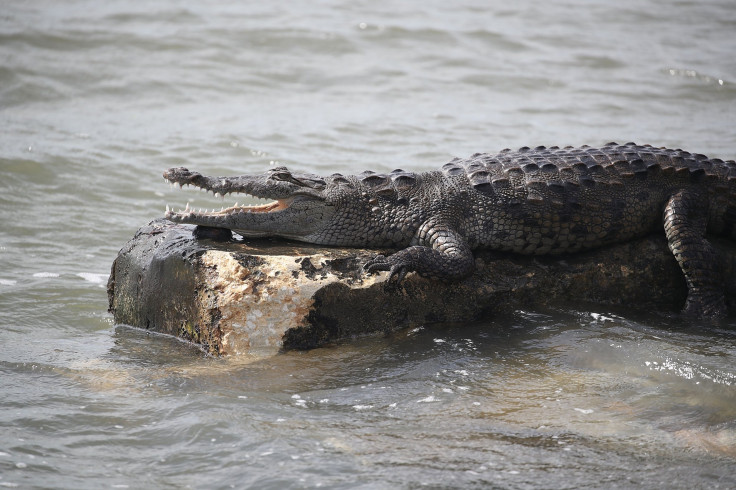$4,000 Reward For Crocodile Killer After 17-Foot Reptile Found Dead In Australia

A giant 5.2-meter (17 feet) saltwater crocodile, which locals describe as the largest-ever carcass to be found in the area, has been found shot dead Thursday in Rockhampton situated in central Queensland, Australia.
Reptile experts in Queensland have raised concerns and said they fear that the death of this crocodile could lead to other crocodiles becoming more aggressive as young males battle for supremacy in their territory.
The male saltwater crocodile was found in the Fitzroy River at Etna Creek, which is situated about 20 kilometers north of Rockhampton, sometime after 1 p.m. EDT on Thursday with the bullet still in its head. PETA in Australia has offered up to $5000 ($3984 in U.S.) as a reward for any kind of information leading to the identification and conviction of the person or people responsible for the death of the reptile, according to the Sydney Morning Herald.
Police are continuing to investigate the death of a crocodile near Rockhampton. @QldEHP https://t.co/CTQN3n3Vn7 pic.twitter.com/DjA0c5y9Lp
— Queensland Police (@QldPolice) September 22, 2017
After the reptile was found, he was taken to the nearby Koorana crocodile farm, where its burial will take place once a necropsy is conducted.
Koorana Saltwater Crocodile Farm owner John Leaver said that such a huge crocodile had not been caught or found in Queensland for 20 to 30 years.
"There may have been some others shot in the wild that we don’t know about, but from my recollection, over the past three decades this would be the largest," he said.
The Queensland Police Service and Department of Environment and Heritage Protection have been investigating the discovery of the reptile. It is illegal to take a crocodile in your own possession without permission, and the maximum penalty for the illegal killing of the reptile is over $28,000 ($23,000 in U.S.).
"Five meters-plus is quite rare, and he's got to be at least 50, 60 or even 70 years of age," Leaver said.
"There has been a pretty strong public reaction against shooting crocs after this discovery. There was another large crocodile shot a while ago on a cattle property, but it was discarded in the river and only photographed by someone in a kayak as it floated past them," he added.
After the discovery, officials believed that the reptile had been dead for a few days before someone among the public spotted it floating and then informed the environmental officers.
Leaver told the Guardian that the gunshot had created a large hole at the top of the reptile's skull and suggested that the bullet came from a "fairly large-caliber rifle."
"I would say that someone felt very threatened," he said, when asked about why he thinks it was shot.
Michael Joyce, southern wildlife operations director at Queensland’s Department of Environment and Heritage Protection, mentioned the concern that the remaining male crocodiles could act differently and become more aggressive to become the alpha.
"They don’t necessarily become more aggressive with outsiders," Joyce said. "But we would expect people to be croc-wise in croc country and be extra vigilant."
Joyce also assured that the wildlife officers would monitor the river to see what turns out and who becomes the next alpha among the males. "The whole thing could be over in 24 hours; at other times it could take months to see a slight move in the population," he said, ABC News reported.
Acting Detective Inspector in the Capricornia Police District in Queensland, Luke Peachey said an autopsy was being conducted on the reptile to provide the authorities with more details. He said offenders in the unlawful killing of the reptile faced up to three years imprisonment if they are found guilty of an offense under the Animal Cruelty Act.
"What we are doing is asking anyone with any information or knowledge on the cause of death of this animal to contact Rockhampton CIB and Crime Stoppers," Acting Detective Inspector Peachey said.
© Copyright IBTimes 2024. All rights reserved.






















